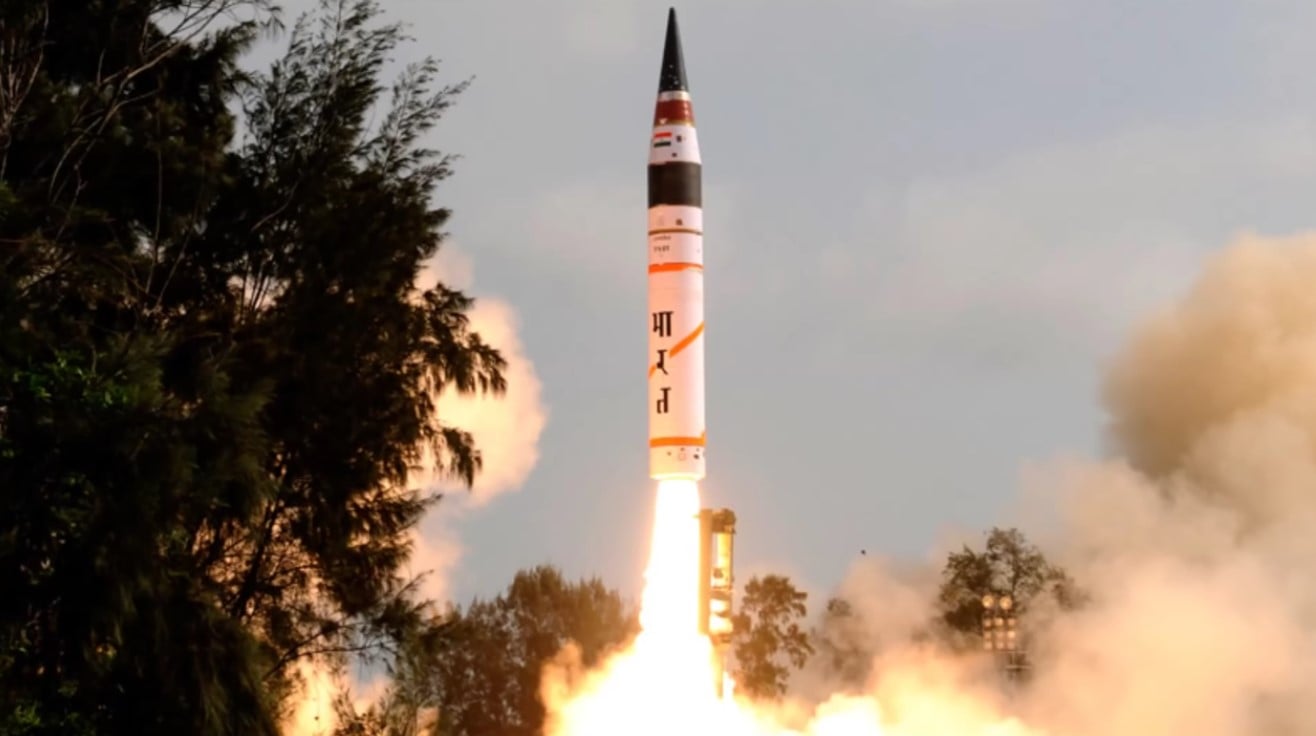According to India’s Defense Ministry, the country has successfully test-fired a long-range intercontinental ballistic missile (ICBM) on Tuesday, marking the arrival of India as a major missile power.
The nuclear-capable Agni-V missile, developed by the Defence Research and Development Organization (DRDO), is believed to be India’s most advanced ICBM. The Agni-V was fired early Thursday morning from Abdul Kalam island, formerly known as Wheeler Island, off the coast of Odisha, a state in eastern India. India’s Integrated Test Range missile testing facility is located on the island.
India’s defense ministry called the test a “major boost” to the country’s defense capabilities, as the nuclear missile’s 3,000 km range puts all of China’s Eastern Seaboard cities within its reach. The success of what the defense ministry called a “pre-induction trial” managed to pave the way for India to join a small list of countries with access to ICBMs, which include the U.S., Russia, China, France and the U.K.
Thursday’s firing of the Agni-V, the third successful launch from a road-mobile launcher, has taken it closer to deployment with India’s Strategic Forces Command (SFC).
The firing of Agni-V, India’s most powerful nuclear missile, comes less than six months after a border dispute with China ended. Dubbed by the New York Times as “the worst border dispute in the last 30 years,” the confrontation between Indian and Chinese soldiers over a remote sliver of land in the Himalayas, called the Doklam Plateau, caused more tensions in the already strained relationship between the countries.
The Agni-V missile, named after a Hindi word for fire, is the latest development in India’s Agni nuclear missile series, first developed in the 1980s. Measuring about 55 feet in length, the Agni-V is capable of carrying a payload of 1.5 tons. According to the New York Times, Agni-V’s payload is enough to transport a fusion-boosted fission weapon, a type of nuclear device, putting most of China, including major eastern coastal cities such as Shanghai, in reach.
India’s president, Ram Nath Kovind, was elated by the missile test, taking to Twitter to say that the test-firing “makes every Indian proud” and “will boost our strategic defense.”
The Indian National Congress party called India’s nuclear missile launch a “the culmination of a multi-decade effort” started by former Prime Minister Indira Gandhi to shore up the country’s arsenal of missiles, the New York Times reported.
The editor in chief of the Delhi Defense Review, Saurav Jha, wrote in an editorial for the review that the development of the Agni-V, India’s nuclear missile, “marks the arrival of India as a missile power.”
India’s nuclear missile news didn’t go well with China
Despite a spokesman for the Indian Foreign Ministry told CNN that India’s “strategic capabilities are not targeted against any particular country,” and that the country abides by its international obligations, the news about the successful launch of Agni-V wasn’t received all that well in China.
China, India’s longtime adversary, has harshly criticized the country’s development of the Agni-V missile in the past, calling for the country to cease further development of the missiles in the wake of the Doklam standoff.
The harsh criticism coming from China is the result of the country’s distrust of India. Du Wenlong, a researcher at the Chinese Academy of Military Science, told the Global Times that the Agni 5 had a strike range of about 5,000 miles, rather than 3,000 miles. Du added that “the Indian government had deliberately downplayed the missile’s capability in order to avoid causing concern to other countries,” resulting in China raising more concerns over the issue.
Li Baodong, China’s permanent representative to the UN, took the floor at an open meeting of the UN Security Council on nuclear non-proliferation on Thursday, saying that despite some positive developments, “the nuclear proliferation issue remains acute.”
Avoiding any direct reference to India, he added “Nuclear disarmament has a long way to go. The nuclear security situation remains grave.”
China most likely not the focus of India’s attention
In spite of the commotion, India’s nuclear missile launch has caused in both in China and worldwide, it’s highly unlikely that targeting Beijing is part of India’s long-term defense strategy.
Narendra Modi, India’s Prime Minister, has made rapprochement a staple of his China policy since he took office. Modi met with Chinese President Xi Jinping at the beginning of the Indian leader’s premiership back in 2014. The two leaders, both considered faces of stark changes in their home countries, spoke glowingly of what the countries could accomplish by working together, CNN reported.
Victor Gao, the director of the China National Association of International Studies, told CNN that he believes Modi has done a good job engaging with China and called the possibility of war between the two countries “completely ludicrous.”
What should be the main concern over India’s nuclear missile launch is Pakistan.
India’s historic adversary boast its own nuclear arsenal, containing between 110 and 130 nuclear warheads, with Karachi enjoying an extremely close relationship with Beijing. Pakistan, China’s strategic partner in the multi-billion dollar CPEC deal, is currently involved in a bitter territorial dispute with India over the contested territories of Kashmir and Jammu.
The bloody territorial dispute is believed to be an excuse for India to build up its missile systems. Matching Pakistan’s nuclear arsenal, India might be using the upper hand it will get to resolve the issue of Kashmir to its benefit. Pakistan, currently holding just over a third of Kashmir’s territory, might see the Agni-V development as proof it’s falling behind in the arms race with India.
According to Yvonne Chiu, a professor of at Hong Kong University, said that India’s nuclear missile development could in effect have spurred Pakistan into the arms race.
“There are multiple audiences for this missile test and multiple possible targets, and I think India’s increased capability will ultimately be more of a concern for Pakistan since it does not yet have a missile with that range of capacity,” Chiu said to CNN.




